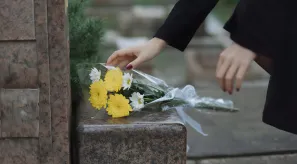The way people cope with the death of a loved one can be very different, not only because of individual issues, but also because of cultural, religious, ideological or traditional factors, among others. This is reflected in the way we honour and remember the deceased.
For example, a Catholic funeral is a ceremony full of symbolism and tradition, offering comfort and hope to family members, as well as time to mourn and reflect. What is the importance of a funeral in the Catholic religion and how has it evolved over the years? At Stelae we will go through the most common rites and traditions with you.
The importance of funerals in the Catholic religion
In the Catholic faith, funerals are much more than just the farewell of a loved one. They are an expression of belief in eternal life and resurrection. According to Catholic doctrine, death is not the end, but a step toward a new existence in the presence of God. This perspective offers comfort to family members, who do not see death as a definitive separation, but as a transition to eternal life.
At a Catholic funeral, the ceremony also serves as an act of community. Family members and friends gather to support each other, pray under the same faith and remember their loved one. This helps to cope with the grieving process, providing a supportive environment in which to share feelings and find comfort in a shared faith.
Catholic rites and traditions at funerals
A Catholic funeral is made up of a series of rites and traditions that reflect Christian beliefs.
One of the most important elements is the funeral mass. During this ceremony, prayers are performed for the soul of the deceased, asking God to grant them eternal rest and peace.
Another relevant aspect is the use of religious symbols, such as holy water, incense and candles.
In addition, the readings and songs selected for the ceremony speak of essential issues for Catholics, such as hope, resurrection or the promise of eternal life.
All of these elements help family members and friends who attend a Catholic funeral to reflect on the beliefs and teachings of the Catholic faith regarding death and the afterlife.
Pre-funeral preparations
Prior to a Catholic funeral, a number of basic preparations are carried out. Just as in the case of a non-Catholic family, the first step is to choose a coffin and decide between a burial or cremation, a choice that the Catholic Church has accepted, as long as it is done respectfully and the ashes are kept in a sacred place.
Next, it is time to plan the ceremony for the Catholic funeral. Given its differences from other types of funeral ceremonies, the readings and the hymns and prayers for the mass are selected as part of the ceremony.
In addition, details such as flowers, music and arrangements for the wake are organised, which is considered as a moment of prayer and remembrance preceding the funeral.
Changes in funeral practices over time
Over the years, Catholic funeral practices have undergone significant changes, adapting to the cultural and social realities of each era. Historically, a Catholic funeral had very restricted rituals, with little room for personalisation. Although it is still quite rigid, there is now greater flexibility to accommodate the wishes of the deceased, within the constraints of such funerals.
Accepting cremations is one of the most notable changes over the years. In the past, the Catholic Church only accepted burials, but now cremations are allowed, provided that they are done respectfully and the ashes are properly treated. The ashes are not allowed to be separated, scattered or kept at home. What is recommended is that they are kept in a sacred place, such as a cemetery.
These changes show that the Catholic funeral has evolved, but that it still maintains certain faith-based traditions. This means that families have to take into account the beliefs of their loved one by organising the corresponding rituals based on these Christian precepts.
Today, there are many rituals for saying goodbye to a loved one that can be carried out. That is why at Stelae we take all kinds of sensitivities into account when we organise any of our services. We listen to the wishes of families in order to adapt to their preferences in this regard.



